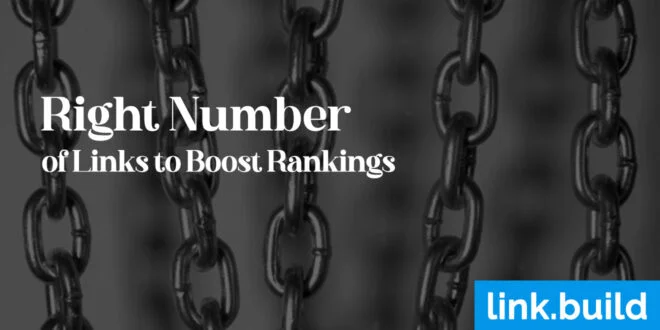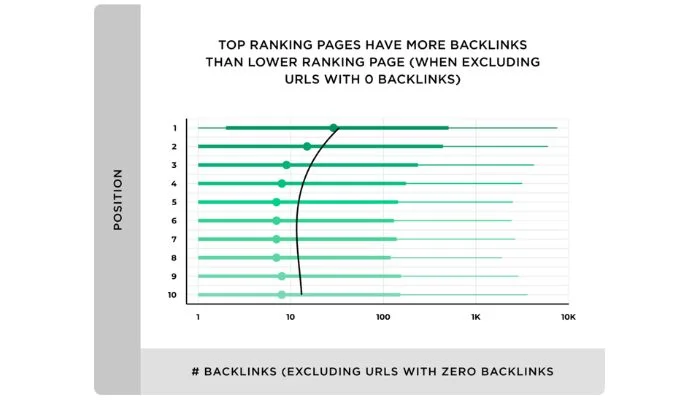How Many Links Do I Need to Rank My Website?

Link building is hugely important for website ranking. It involves the placement of hyperlinked words and phrases from external sources to a given website to increase its trustworthiness, and relevance as well as Search Engine Optimization (SEO) ranking.
Despite its importance, achieving effective link building requires careful answers to numerous questions–one of which is determining an optimal number of links to include on a web page in order to achieve a target keyword's position on a search engine page result (SERP).
This blog post will show the importance of measuring relevant factors such as trustworthiness or the competitiveness of the keyword when establishing an effective link-building approach that deals with quality links only, implemented within natural metrics and assessment process involving strong backlink profiles with greater SEO impacts.
First, What is Link building?

Link building is the process of actively acquiring internal links with the goal of increasing a website's visibility in Google search results. These incoming links from other reputable websites indicate popularity and drive referral traffic, which can ultimately maximize conversions and organic web traffic.
Links built must be natural, i.e., acquired gradually over time, as opposed to obtaining thousands of links within a short period. One should consider link quality alongside quantity when link building to ensure relevance to the topic at hand and promote best practice methods that won't get penalized by Google.
Link quality and relevance
Link building is a critical part of search engine optimization (SEO) that involves developing high quality links to and from websites, thereby increasing website visibility on search engine results pages.
Quality and relevance are two important components when it comes to link building.
Relevant backlinks should only be established between related sources, and those links should come from authoritative websites for the best SEO performance.
Link quality can also refer to the trustworthiness of other websites linking back to the source website, which speaks volumes about its authority and will have a strong influence on its ranking potential.
A poorly targeted link profile may garner limited relevance while providing no real SEO advantage, thus hampering any success achieved with link building efforts.
Pro tip: some of the most relevant links you can get with the lowest cost will be the internal links pointing back to other pages on your website.
Factors influencing the number of links needed
Competitiveness of the target keywords
The number of links needed to improve website ranking depends on the competitiveness of the chosen target keywords. In general, higher levels of competition will require a greater number of links for quality page rankings, as more effort is necessary to compete with all other established and authoritative websites vying for the same search traffic.
Additionally, if your competition has already managed to acquire many relevant links from trustworthy domains (high authority and relevancy), achieving minimally acceptable rankings may not be possible without similar—or even greater—levels of link building activity on our end.
Authority and trustworthiness of the website
The authority of a website is a vitally important ranking factor when it comes to determining how many backlinks or links are necessary for success.
High-authority websites will likely require fewer links than moderately lower ones, while poorly performing sites may need significantly more before they start seeing results.
Search engine algorithms give higher weight to trustworthy sites with good track records, so investing in high quality backlinks from trustworthy sources can be particularly beneficial.
Furthermore, off-page ranking signals – such as the backlink profile – can also prove invaluable for gaining search engine trust; therefore, building a portfolio of quality links is essential in link building strategies.
Relevance and quality of the linking websites
The relevance and quality of the linking websites are key factors for determining the optimal number of links required for website ranking.
Google prioritizes websites with relevant and trustworthy inbound links, so including links from other authoritative sites is important.
Backlinks should come from an array of referring domains (including non-authority passing nofollow links) that each offer a unique take on information related to your own domain; if all the backlinks come from similar sources, recognition by search engine algorithms can decrease.
Best practices for determining the optimal number of links

Conducting keyword research and analysis
Conducting keyword research and analysis is a foundational element for determining the optimal number of links needed to improve website ranking. Through this process, websites can clearly identify relevant target keyword and get an idea of how much competition they have on search engine results pages.
Knowing which words are most popular for web searches can not only robustly optimize campaigns, but also help inform future link building tactics. Moreover, it provides guidance to determine the volume and intensity implicit in successful competitors' strategies and helps direct both quantity and quality initiatives when acquiring new links.
Analyzing competitors' link profiles
Link building requires a tailored approach for each website in order to be successful. Therefore, before thinking about how many links to acquire it is important to look at others who have been successful with search engine ranking. One suitable way of doing this is by performing an analysis of competitors' link profiles.
This involves studying competitors' backlinks in order to identify features of the strategy that can be recreated.
Specifically, analysts can examine the quantity and quality of their inbound and outbound links, as well as the
URLs linking websites are using for anchor texts in their link acquisition efforts.
Answering these questions will give SEF professionals higher confidence when moving on to set specific goals for generating new links while boosting web page authority levels among engines such as Google.
Considering the website's domain authority
When considering the number of links needed to achieve favorable ranking results, website domain authority should be a primary focus.
This metric grades websites on a scale from 0-100 based on the quality and quantity of their inbound and outbound links. The higher the score, the more indicative it is of a site's link relevancy and weight among search engines.
As domains with increasing levels of authority can often require fewer (but stronger) links to gain similar page rank boosts, analyzing this rating as part of any budgeting or targeting decision could prove cost-efficient in generating smoother SERP placements.
Implementing a strategic and natural link building approach
Effective link building involves creating and acquiring links to a website that will help boost its presence in search engine rankings. One of the most important aspects of this process is determining an optimal number of links for effective ranking. Implementing a strategic and natural link-building approach, as opposed to just "gaming" the system with high quantity regardless of quality, can be one way to achieve this easily.
This approach involves researching target keywords, taking stock of current backlink profiles, and understanding competitor strategies, all while focusing on increasing quality rather than quantity over time.
Additionally, focusing more on developing relationships organically through outreach results in enhanced domain authority due to the strong authenticity present between web pages.
If done purposefully with an earned reputation (not just backlinks) along with organic SEO actions like blogging, link building can greatly improve a website's search engine positioning and result in optimal success.
Monitoring and adjusting link building efforts
Tracking keyword rankings and organic traffic
Monitoring and adjusting link building efforts is an important step to ensure successful rankings. Regularly tracking keyword rankings should be undertaken so you can gauge how your website is performing for the targeted keywords and compare it with competitors.
Analyzing organic traffic can also provide an estimation of the performance of visitors from search engines, as opposed to direct or referral sources. Both these metrics will enable an understanding of how effective your current link building approach has been over a period of time and whether any improvements are needed for continued development.
Analytics tools play a big part in achieving this, as data-backed decisions can really help shape future marketing strategies when making some industry-critical decisions about where and what to target next.
Adjusting such strategies based on real outcomes gives businesses a better chance to score successful results and stay ahead of the competition in the long term.
Analyzing the impact of acquired links
Monitoring the impact of acquired links is essential for successful link building and website ranking. Link analysis allows you to identify which links have a positive effect on your rankings and which ones may be hurting them.
This in turn can inform how link optimization should go forward: if some domains' contribution is minimal or decreasing, their relevance needs to be reevaluated before additional efforts are made into obtaining more backlinks from these sources.
Additionally, analytics like broken links should also be tracked as they can impede overall rankings and thus require preventive action if any kind of prolonged success in link-building tactics somehow depends on maintaining these resources alive. Keeping this in mind allows link builders to eliminate poor link choices quickly and move on to better ones.
Conclusion
Link building is a crucial part of any successful SEO strategy, and though it is changing as far as best practices are concerned, the fundamental goal remains achieving higher search engine rankings.
When it comes to determining the optimal number of links for a website, factors such as keyword competitiveness and domain authority must be considered in making an informed decision.
Through research, analysis, continuous monitoring, and adjustment based on results achieved, one can build a natural link profile that will support organic search engine ranking growth in the long run.
Link building should never be rushed or practiced with artificially created links (unless of course you're creating internal links); businesses must approach this process methodically and strategically, taking into account all necessary ranking criteria.
A comprehensive and consistent link building endeavor pays off in improved organic rankings over time.


.svg)


.jpg)
.jpg)